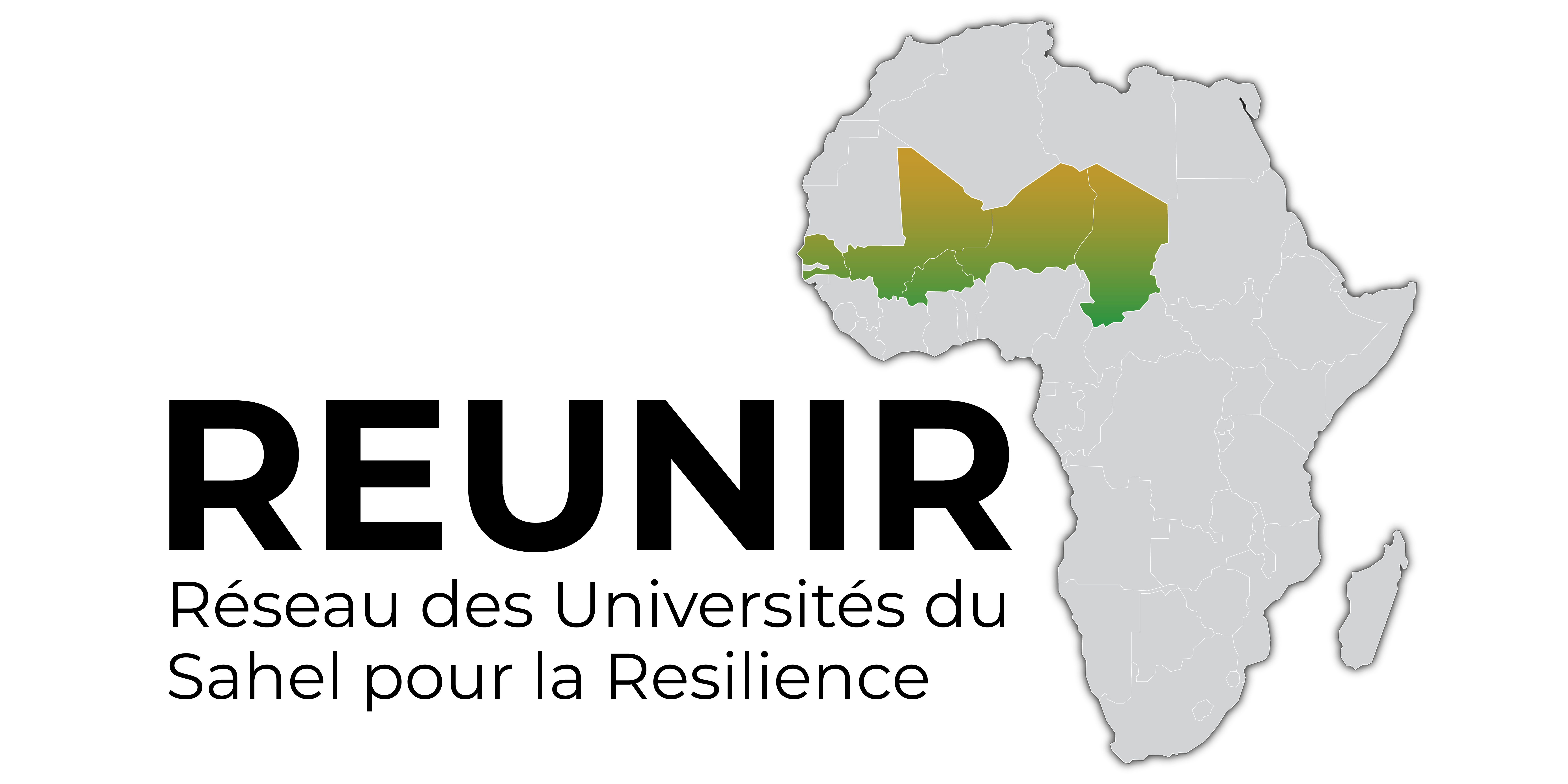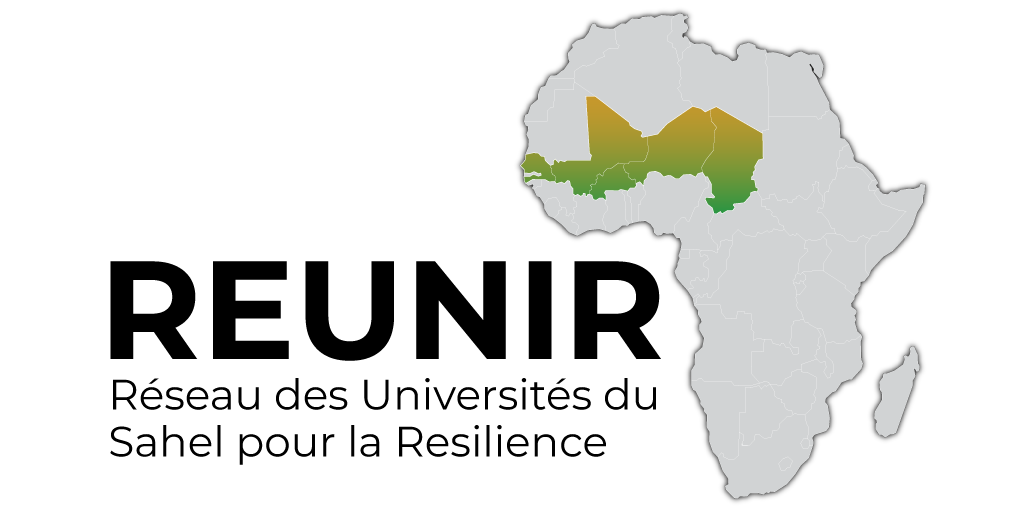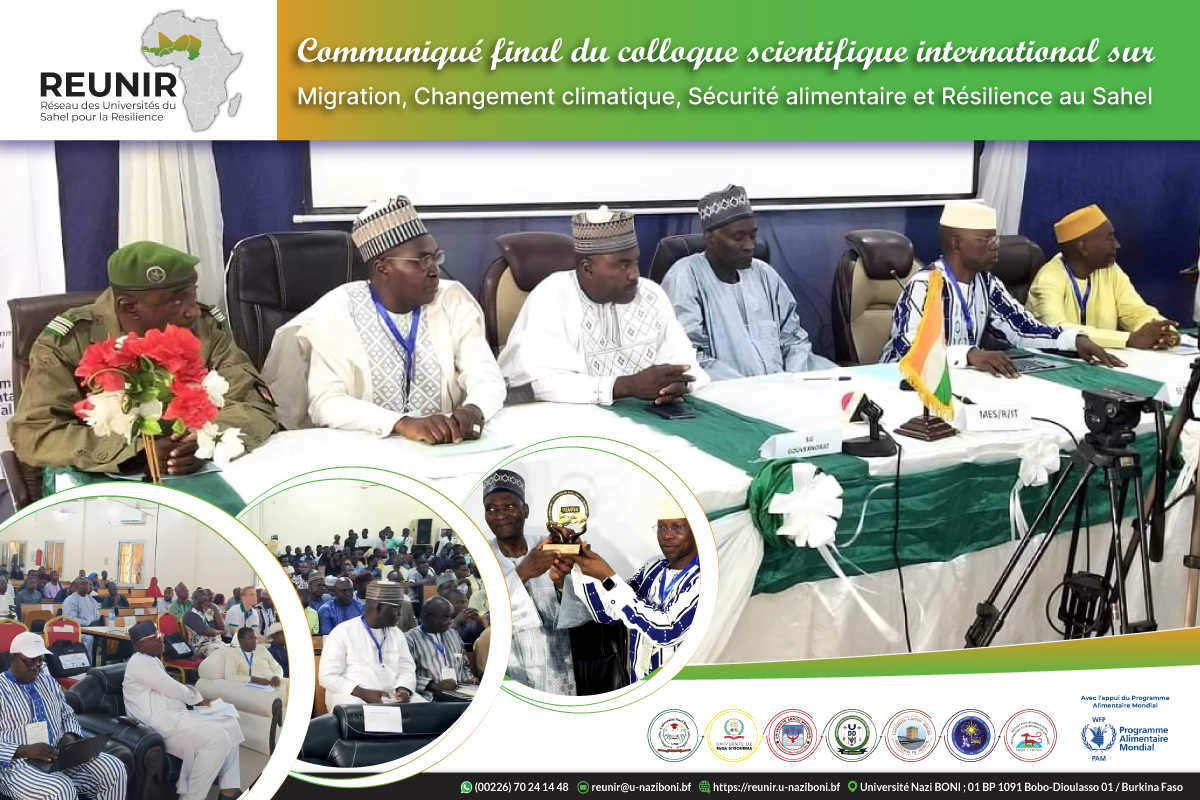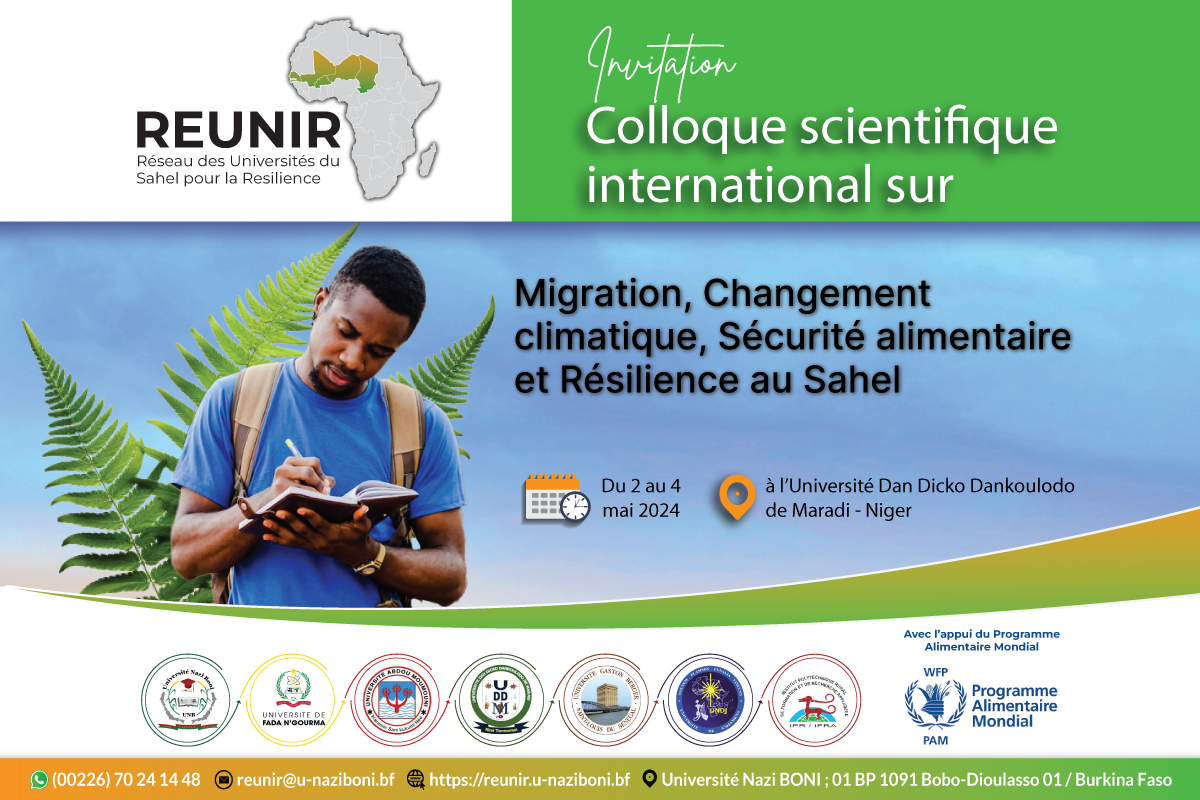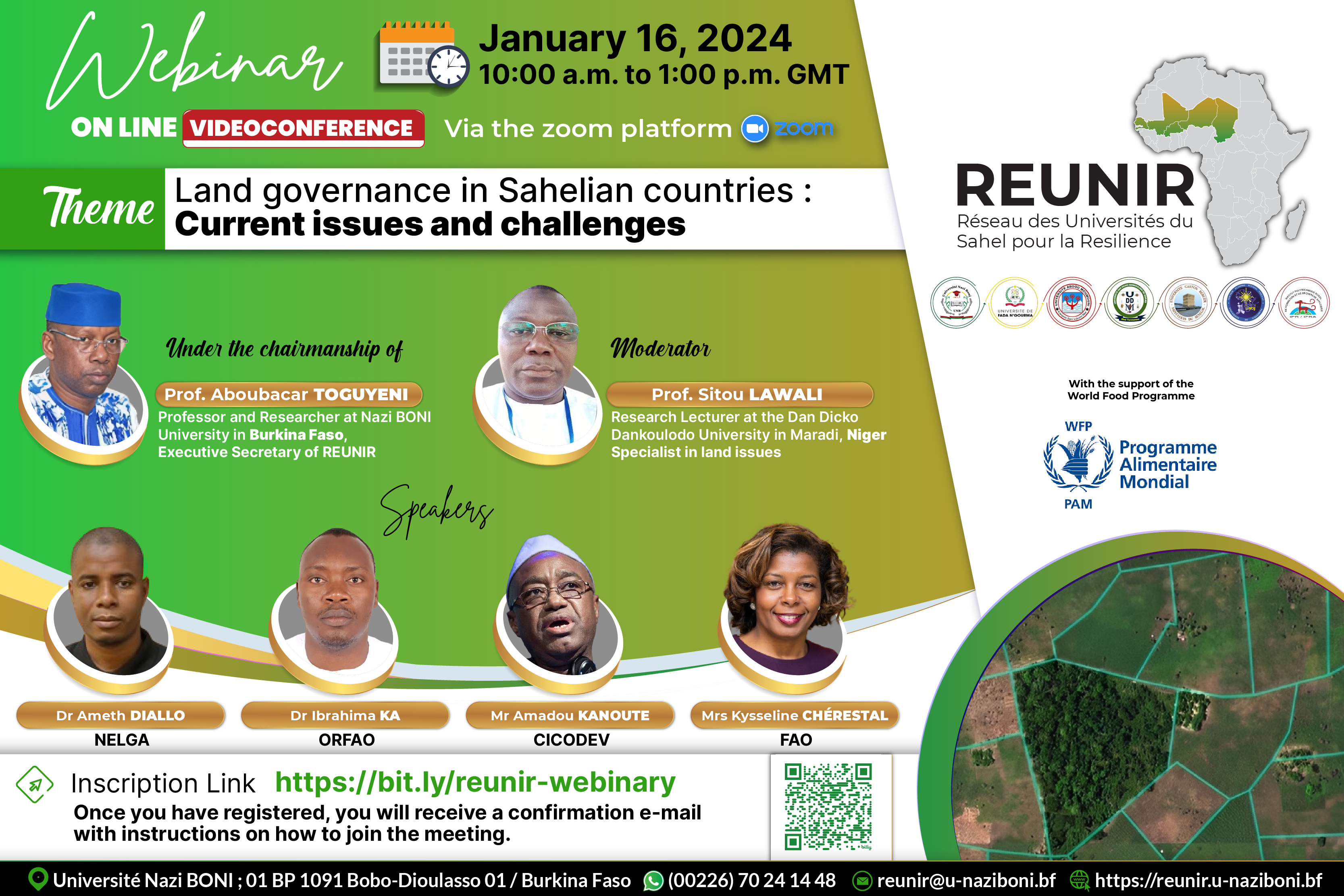Communiqué final du colloque scientifique international sur« Migration, Changement climatique, Sécurité alimentaire et Résilience au Sahel »
Du 2 au 4 mai 2024 s’est tenu dans l’auditorium de la Faculté d’Agronomie et des Sciences de l’Environnement de l’Université Dan Dicko Dankoulodo de Maradi le colloque scientifique international sur « Migration, Changement climatique, Sécurité alimentaire et Résilience au Sahel » organisé par le réseau des Universités du Sahel pour la résilience (REUNIR) à l’Université Dan Dicko Dankoulodo de Maradi au Niger.
Cette rencontre scientifique internationale a vu la participation d’éminentes personnalités scientifiques venues des Universités du Nigéria, du Sénégal, du Burkina Faso, du Mali, du Tchad, de la côte d’Ivoire, des Universités publiques du Niger, des centres de recherche et des représentants des institutions des Nations Unies, des ONGs, Projets et programmes.
Placée sous le haut patronage du Ministre de l’Enseignement Supérieur de la Recherche et de l’Innovation Technologique Professeur MAMADOU Saidou, ce colloque a été marqué par la présence d’éminentes personnalités administratives et coutumières et les membres du bureau de REUNIR, tous venus pour échanger sur les enjeux et défis de développement de la région du Sahel.
Après la cérémonie d’ouverture riche en allocution dont celle du Ministre de l’Enseignement Supérieur de la recherche et de l’Innovation technologique, Pr Mamadou Saidou, parrain de l’évènement .
Le colloque a débuté par une conférence inaugurale sur « la problématique de développement durable au Sahel – enjeux et défis » co-animée par M. Volli Carucii du PAM et Pr Emérite Ambouta Karimou de l’UAM. Trois jours durant, les participants ont débattu sur d’importants points :
Le rappel de l’historique de la création de REUNIR ainsi que les enjeux et causes qui ont motivé cette initiative et les objectifs assignés à cette structure.
🔬 Le colloque scientifique international de Maradi a enregistré une cinquantaine (50) de communications sur divers sujets au tour de quatre panels de discussions dont :
- Panel 1 : Sécurité alimentaire et nutritionnelle, migration et développement durable au Sahel ;
- Panel 2 : Changement climatique et pratiques agrosylvopastorales et halieutiques ;
- Panel 3 : Gouvernance des ressources naturelles et gestion durable des terres pour la résilience ;
- Panel 4 : Systèmes et approches de gestion durable des flux migratoires ;
- Et enfin unetable ronde de réflexion avec les partenaires pour les perspectives de recherche sur les enjeux de développement et la résilience au Sahel.
📚 Recommandations
Aux termes des travaux les participants au colloque international ont formulé d’importes recommandations :
- Développer des recherches sur la problématique de la sécurisation foncière afin de sécuriser les investissements en matière de la gestion durable des terres et le pastoralisme ;
- Vu l’ampleur du développement de la régénération naturelle assistée, la recherche doit mener des investigations pour promouvoir une gouvernance durable des ressources naturelles ;
- Promouvoir la recherche scientifique sur la biodiversité végétale et animales locales pour la construction de la résilience des communautés et des écosystèmes durables ;
- Approfondir la recherche sur la migration qui est un phénomène naturel afin d’établir un lien entre la migration des populations, l’environnement et la gestion des ressources naturelles ;
- Promouvoir la recherche scientifique sur l’agroécologie pour une transition agraire et une sécurité alimentaire et nutritionnelle durable ;
- Prendre en compte la dimension genre dans le programme de résilience afin de promouvoir l’équité entre les groupes socioprofessionnels dans toutes les communautés des pays du sahel.
- Appuyer le dispositif d’appui conseil pour la diffusion des résultats de le recherche pour plus d’impacts en matière de résiliences des communautés et des écosystèmes déjà fragilisés par les actions atrophiques et les effets des changements climatiques ;
- Créer un cadre inclusif et participatif d’évaluation des technologies la gestion durable des terres afin de promouvoir et mettre à l’échelle les meilleures technologies dans les différents pays du sahel ;
- Promouvoir l’organisation des Universités d’été afin de donner l’opportunité aux agents de terrain de renforcer leurs capacités d’acteur de développement ;
- Mettre en place un dispositif efficace de mobilisation des fonds pour assurer la continuité des activités prévues dans le plan stratégique du réseau ;
- Etablir un partenariat fructueux avec d’autres réseaux visant le même objectif dans la perspective de mise en place d’une confédération des réseaux ;
- Accélérer la signature des conventions de partenariat avec d’autres institution pour renforcer le dispositif d’appui technique et financier du réseau ;
- Renforcer ce genre de rencontre scientifique qui constitue un meilleur cadre d’échanges et de renforcement des capacités des chercheurs, des techniciens de terrain et des étudiants ;
- Le comité scientifique du colloque doit mettre plus de rigueur dans la sélection des communications afin d’aboutir à la production d’articles de haute qualité scientifique ;
- Les participants recommandent au secrétariat exécutif d’intensifier les échanges avec les universités qui ont reçu leur lettre d’admission de bien vouloir concrétiser leur qualité de membre ;
👏 Motions de remerciement
- Les participants au colloque scientifique international remercient les autorités rectorales et la communauté universitaire de l’UDDM pour l’accueil chaleureux et l’organisation sans faille avec la satisfaction des participants.
- Les participants au colloque scientifique international remercient vivement le PAM pour le plaidoyer, l’appui constant et l’accompagnement permanent de REUNIR pour son développement.
- Les participants au colloque scientifique international remercient vivement les autorités administratives et coutumières de la région de Maradi pour l’accueil chaleureux et leur disponibilité.
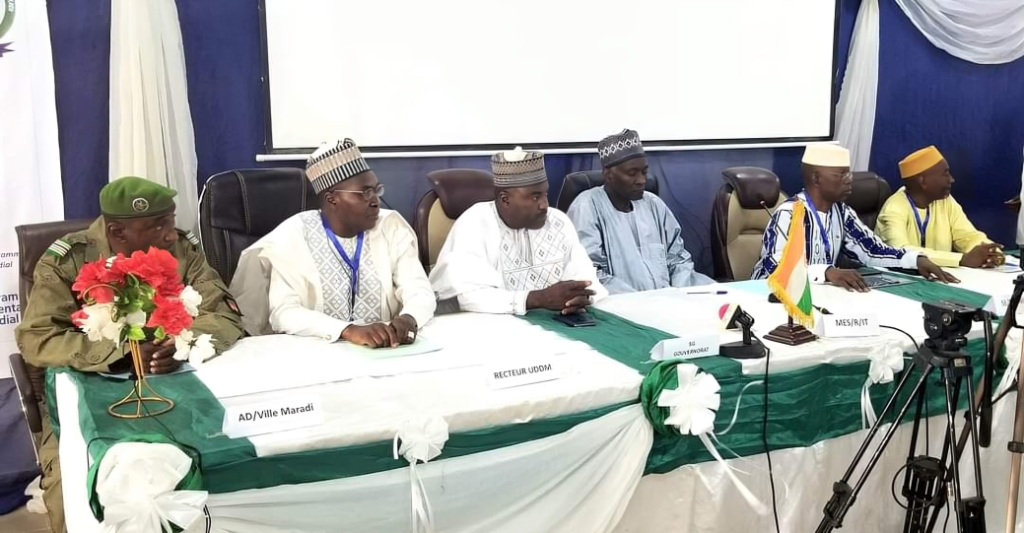
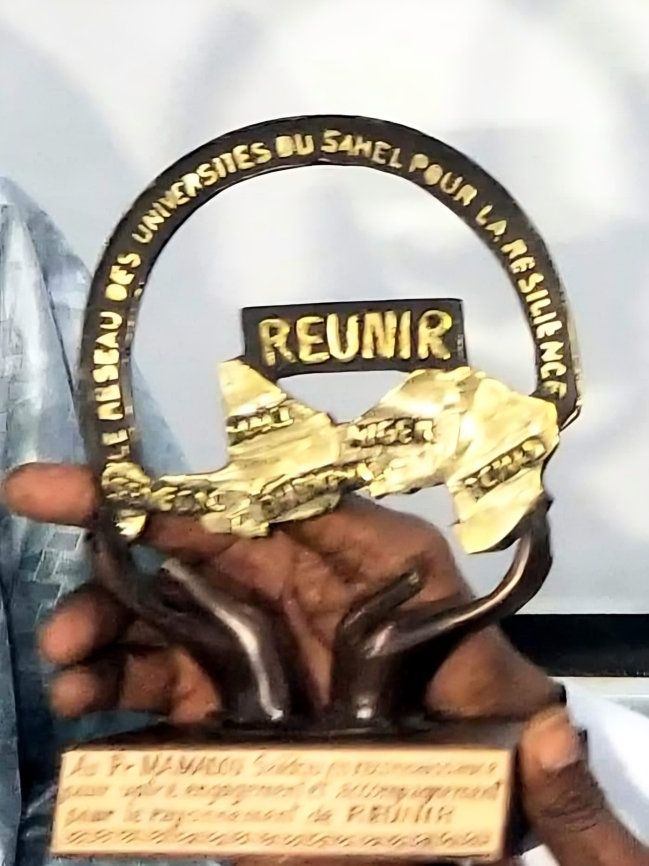
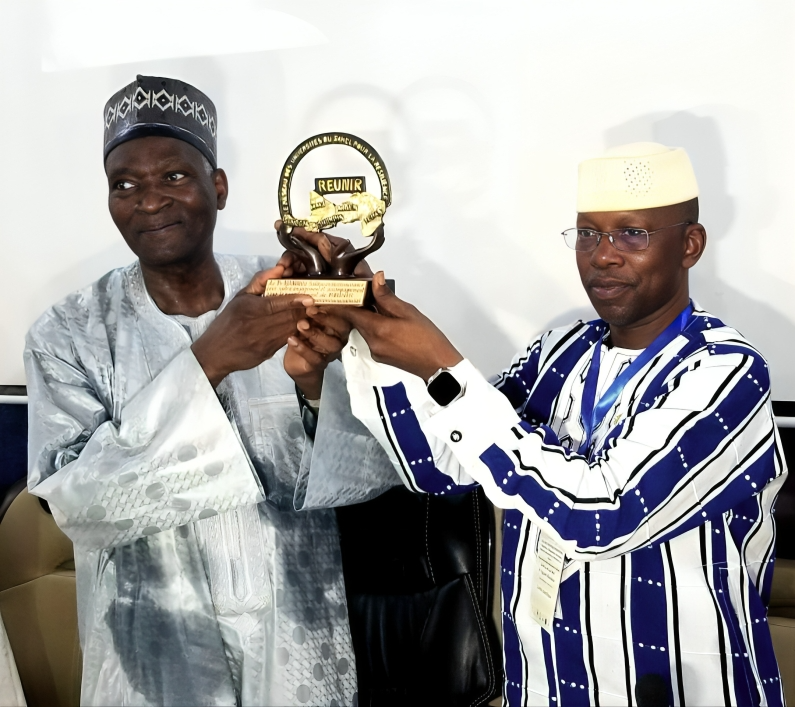

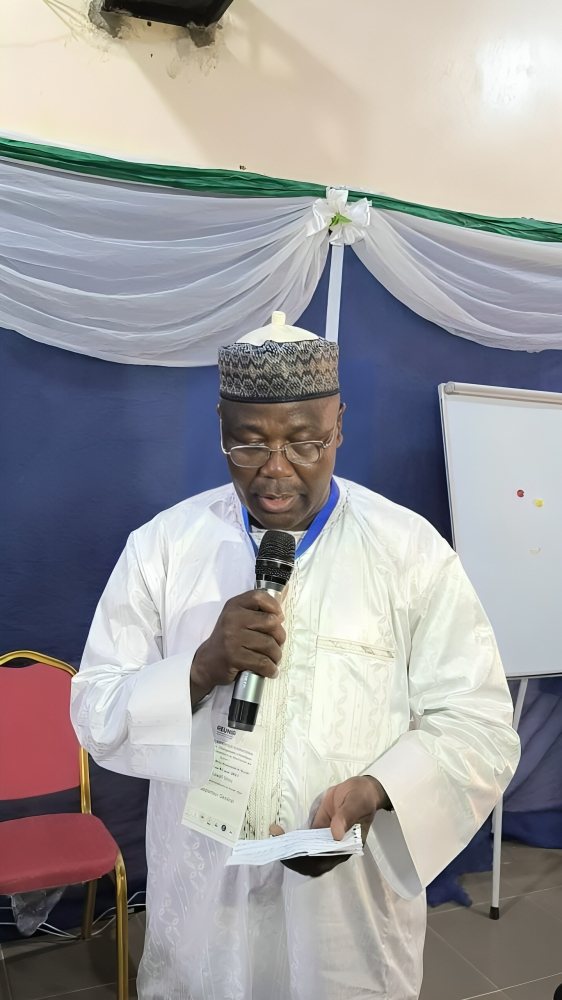
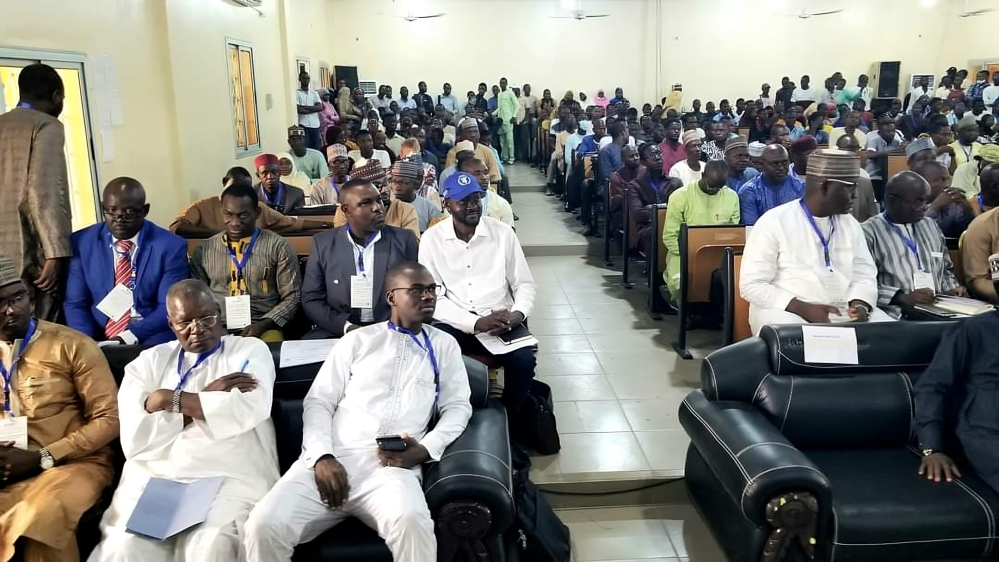
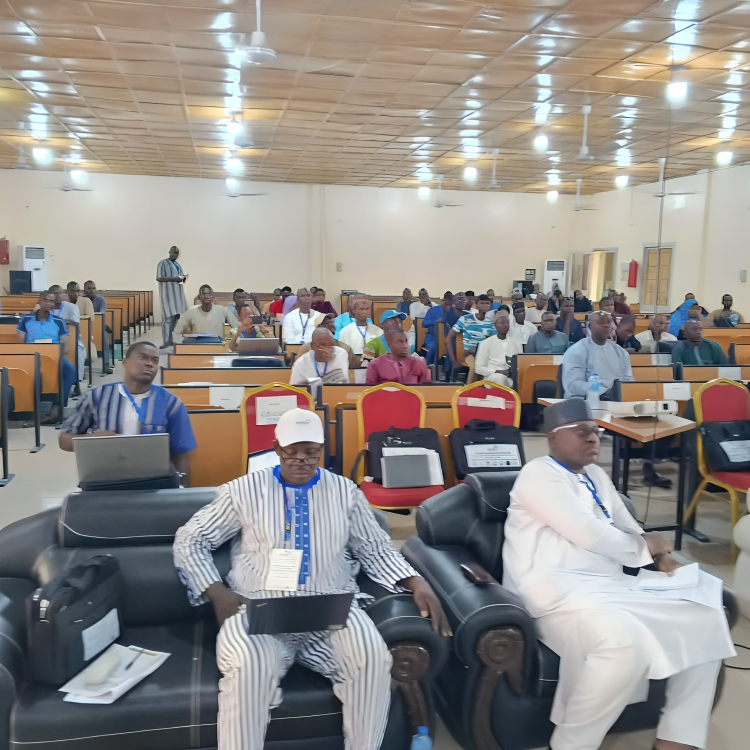
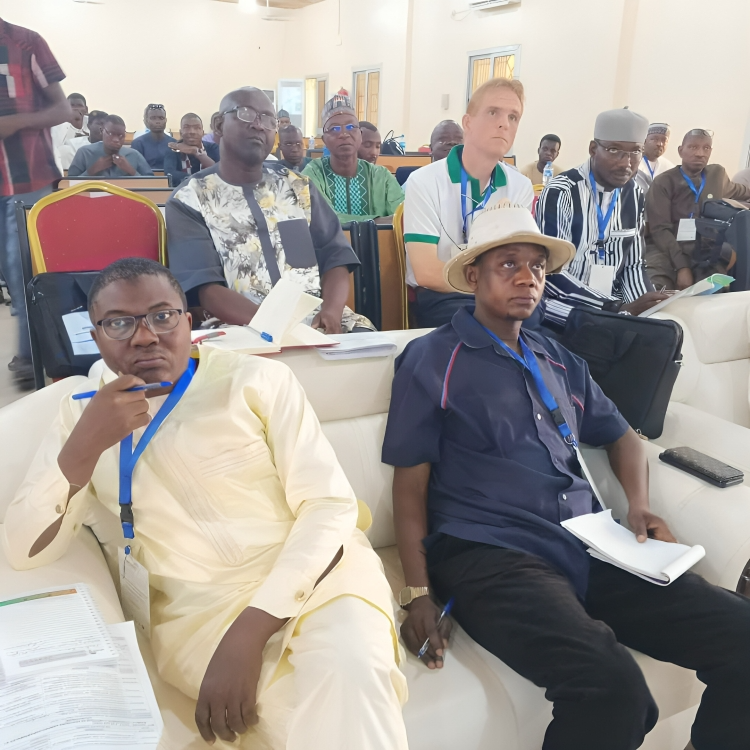


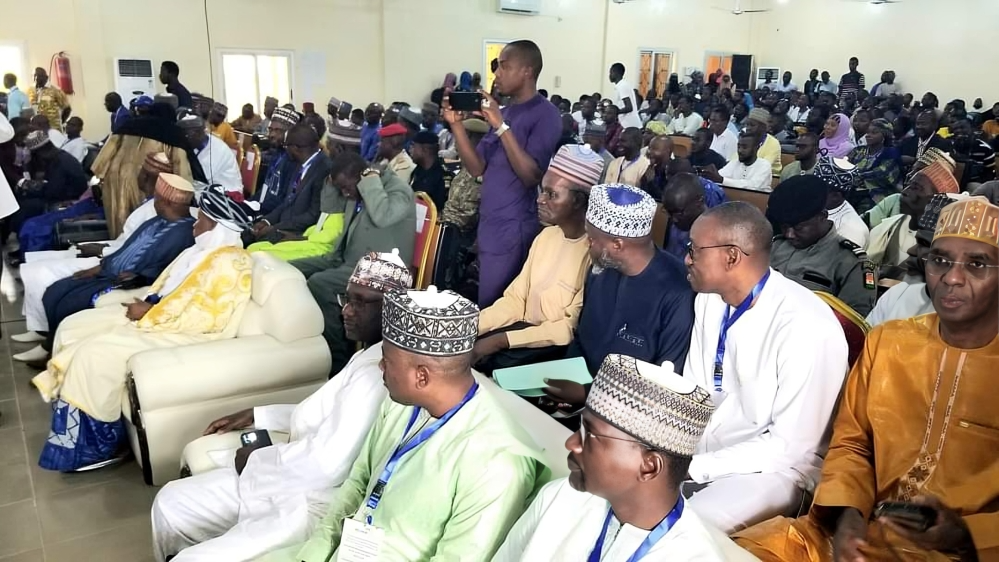
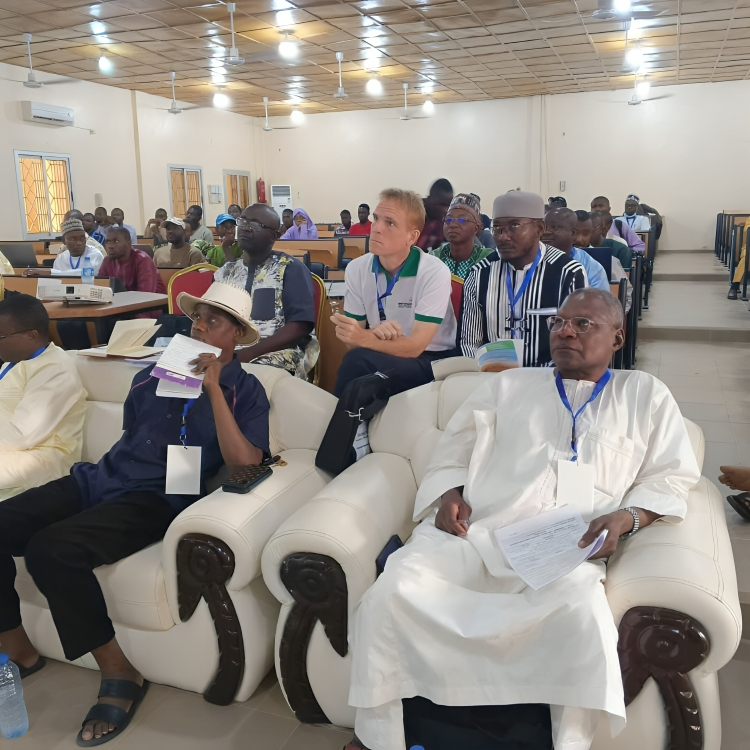
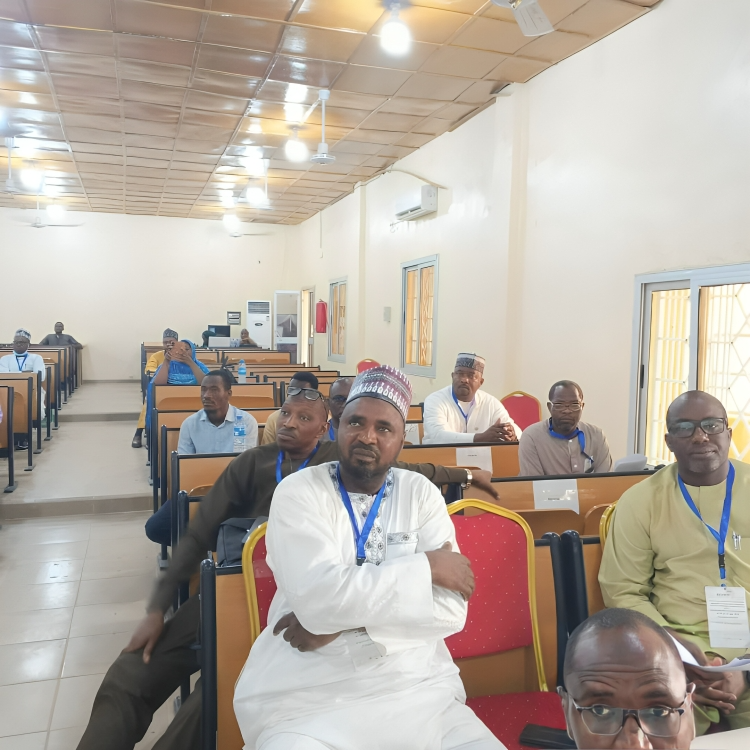
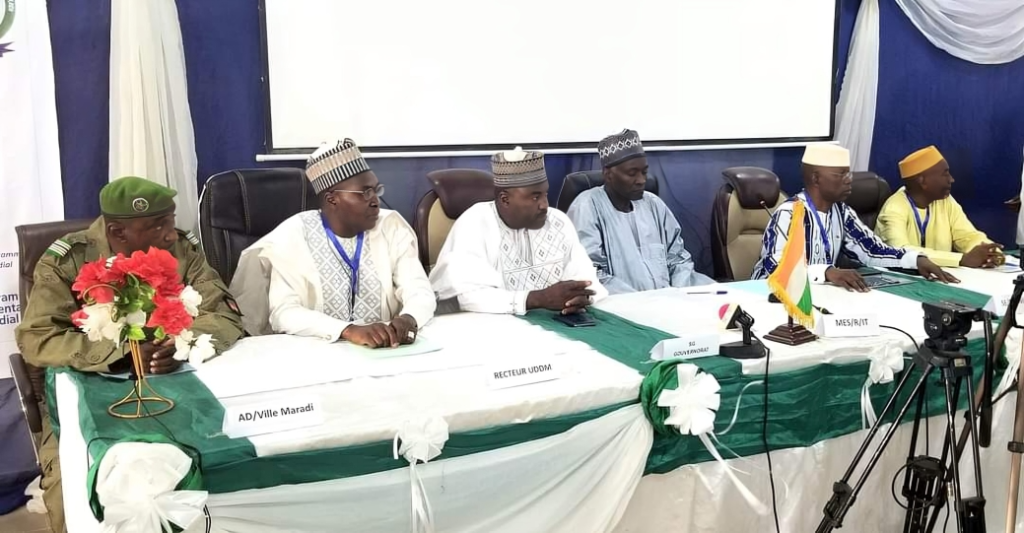
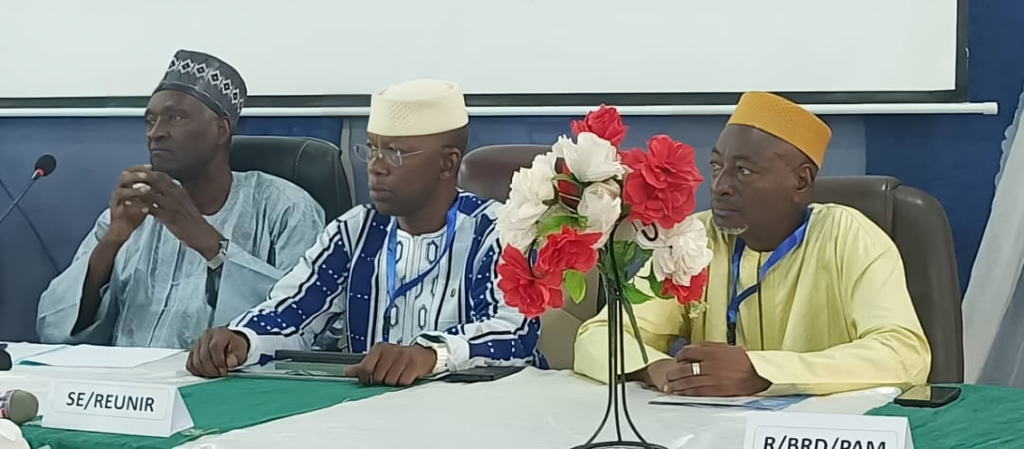

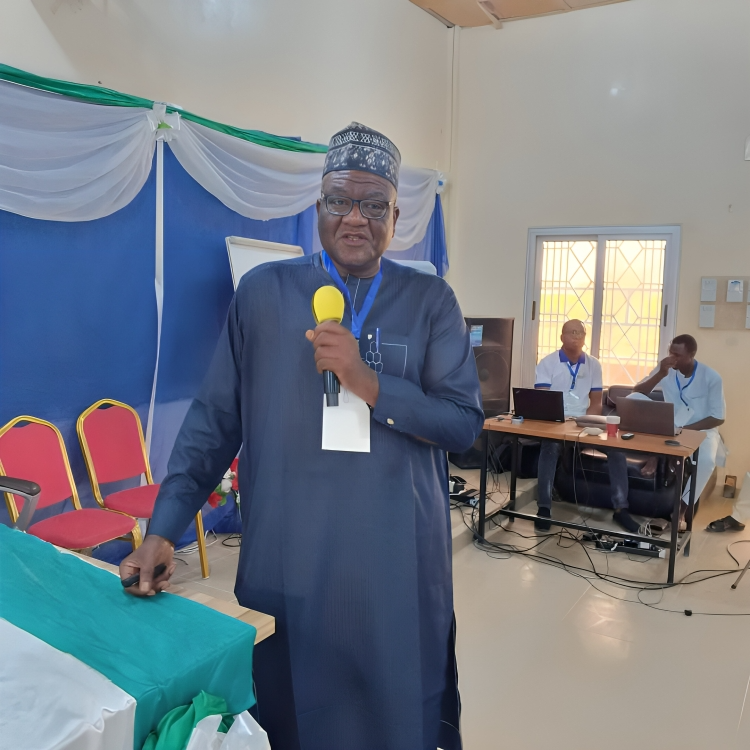
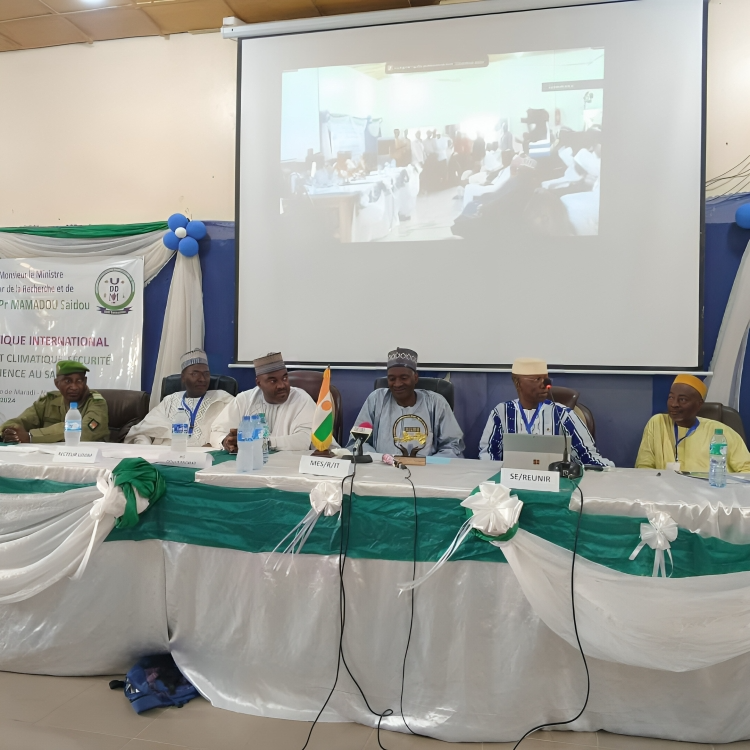
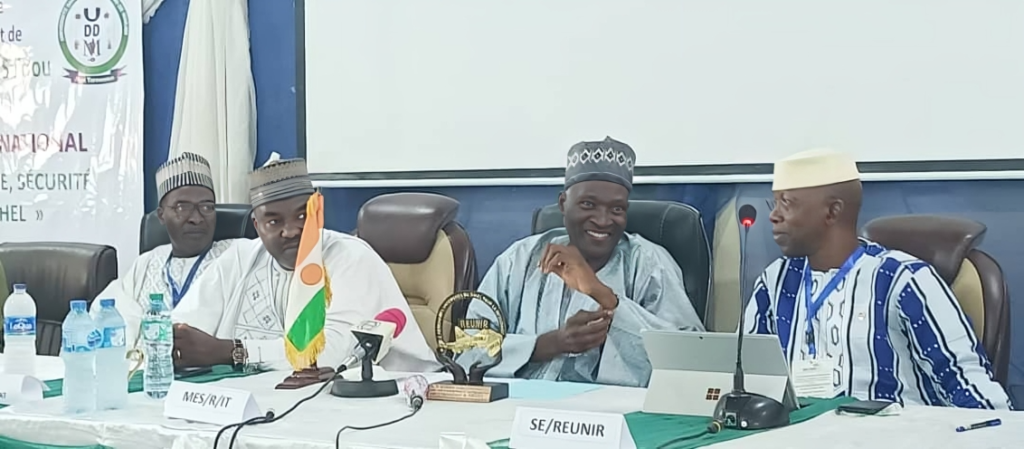
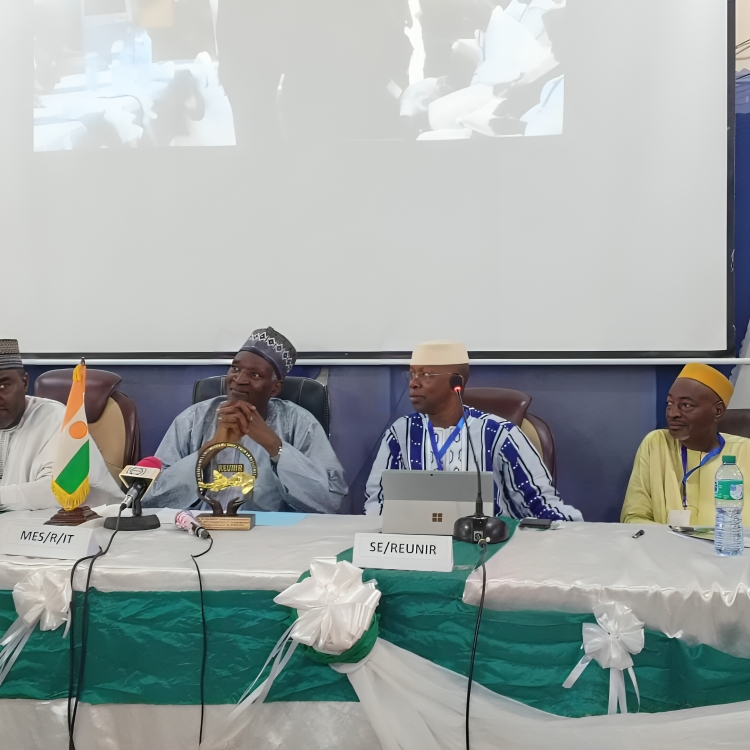
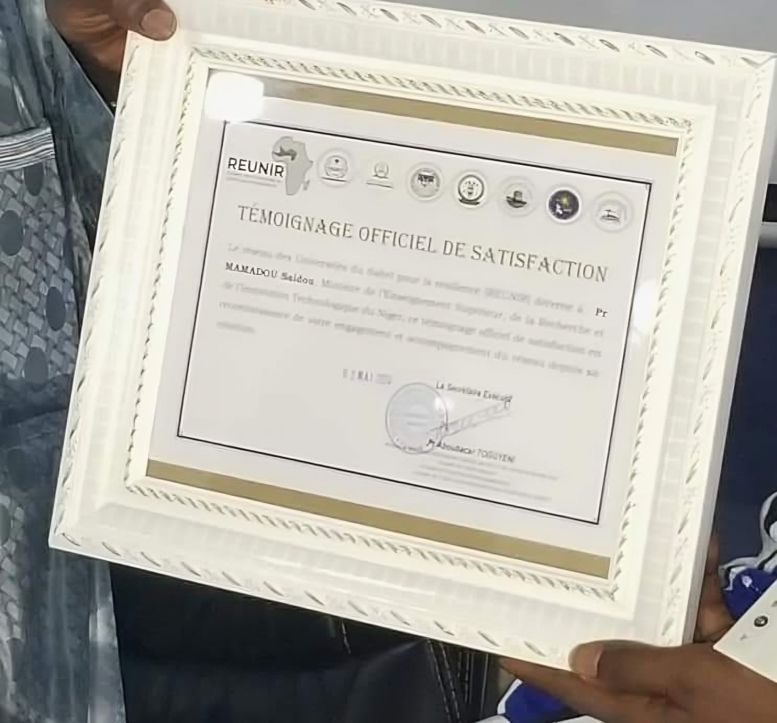
Discours d’ouverture du colloque
Ministre de l’Enseignement Supérieur de la Recherche et de l’Innovation Technologique
Monsieur Secrétaire
Messieurs les Recteurs et Directeurs Généraux
Messieurs les autorités administratives, religieuses, coutumières, militaires en vos titres et grades respectifs
Monsieur le Président d’honneur de REUNIR
Messieurs les Membres du bureau de REUNIR
Membres du Comité scientifique du colloque
Chers collègues enseignants-chercheurs et chercheurs,
Chers invités,
Chers étudiants
Mesdames et messieurs
Bonjour
J’ai l’insigne honneur de prendre la parole ce matin pour vous souhaiter, aux noms de l’ensemble des membres du bureau de notre réseau à savoir le Réseau des universités du Sahel pour la Résilience (REUNIR) que de ceux des enseignants-chercheurs ici présents, la bienvenue.
Merci pour l’honneur et l’amitié que vous nous faites d’être des nôtres ce matin, à l’occasion de cette cérémonie d’ouverture de notre colloque scientifique international sur le thème « Migration, Changement climatique, Sécurité alimentaire et Résilience au Sahel »
Je tiens particulièrement à dire merci à Monsieur le Ministre pour avoir répondu favorablement à notre sollicitation malgré son calendrier très chargé. Je suis convaincu que la fibre familiale a été pour beaucoup. C’est bien sûr la famille des enseignants-chercheurs puisque Monsieur le Ministre est Professeur titulaire des universités. C’est aussi l’affection d’un père envers son enfant. En effet, Monsieur le Ministre était à Ouagadougou pour consacrer la naissance de REUNIR. Merci Monsieur le Ministre d’avoir cru et d’avoir apporté votre soutien indéfectible à notre réseau.
Votre présence à tous à cette cérémonie, malgré vos calendriers chargés, est un vibrant témoignage de votre attachement à REUNIR. Je vous demande de l’ovationner.
Monsieur le Ministre de l’Enseignement Supérieur et de la Recherche Scientifique
Messieurs les Présidents, Recteurs et Directeurs Généraux
Monsieur le Président d’honneur de REUNIR
Chers collègues,
Chers invités,
Mesdames et messieurs
Notre région sahélienne est caractérisée par des disparités spatiotemporelles des caractéristiques climatiques qui influent négativement sur les moyens d’existence des communautés et particulièrement sur les productions agrosylvopastorales et halieutiques. Cette situation a conduit les pays du Sahel dans une situation d’extrême vulnérabilité quasi-permanente, avec une récurrence des sècheresses, des inondations, des attaques de ravageurs, la dégradation continue des terres et une désertification progressive du milieu naturel.
A ceux-là, il faut ajouter un autre changement majeur de contexte au niveau régional, c’est la montée de l’insécurité et la prolifération de groupes armés, qui sont venues fragiliser davantage la résilience des populations. Le Sahel est aujourd’hui abordé désormais majoritairement sous un angle sécuritaire ou migratoire alors que les populations sont plus que jamais confrontées au problème de la faim.
C’est dire donc, plus que jamais, la construction de la résilience pour la sécurité alimentaire et nutritionnelle est un impératif pour l’ensemble de nos pays, et cela nécessite l’union sacrée de toutes les forces, qu’elles soient du monde universitaire, communautaire, associatif que des populations concernées.
C’est dans ce sens que le PAM et les universités des pays du Sahel, se sont tendu la main par la signature de convention de partenariat dont les objectifs principaux sont l’élaboration de connaissances, de savoirs et de savoir-faire afin d’accompagner les valeureuses populations à travers la formation des apprenants et la recherche de solutions plus adaptés au contexte local.
Ce partenariat aboutira à la création de REUNIR en janvier 2020 à Ouagadougou.
Pour revenir au colloque, je voudrais souligner que l’idée est née ici à Maradi lors de ma tournée de présentation du réseau aux premiers responsables des universités membres et aux premiers responsables des secteurs ministériels concernés prioritairement par cette question de la résilience. Lors de mon entretien avec le Recteur d’alors, Pr Zakari Moussa Ousmane, nous avons évoqué la question des camps des déplacés internes mais aussi des réfugiés. C’est alors que nous avons convenu de murir l’idée de l’organisation d’un colloque sur la migration au vue des nombreuses préoccupations que cela posait tant pour les déplacés et réfugiés que pour les populations autochtones receveuses. Je suis donc heureux que ce qui n’était qu’une simple idée au départ se concrétise aujourd’hui, et ceci grâce à la détermination des membres du bureau de REUNIR, des premiers responsables des universités membres et de notre partenaire stratégique, j’ai nommé le PAM, qui a abouti à l’élargissement du thème Changement climatique, Sécurité alimentaire et Résilience.
Monsieur le Ministre,
Mesdames et Messieurs
Au-delà des questions alimentaires, d’autres défis sociaux, dont la crise sécuritaire et migratoire avec un nombre croissant de réfugiés et de personnes déplacées internes, impactent négativement le Sahel.
Selon les dernières données statistiques du Burkina Faso, au total, 2 062 534 personnes déplacées internes ont été enregistrées par le Secrétariat permanent du Conseil national de secours d’urgence et de réhabilitation (SP/CONASUR) à la date du 31 mars 2023, soit environ 10% de la population du pays. Plus de 1,3 million de Burkinabè sont devenus des déplacés internes en un peu plus de deux ans.
Au Mali, au 30 avril 2023, il y avait 375 000 personnes déplacées internes (PDI).
Au Niger, à la date du 17 mai 2023, environ 670 000 personnes étaient en situation de déplacement forcé, comprenant 378 000 déplacées internes, 255 000 réfugiés dans plusieurs régions, ainsi que des anciens réfugiés dans la région de Diffa.
Ces chiffres reflètent les défis humanitaires auxquels les pays du Sahel sont confrontés, et les énormes efforts continus qu’ils doivent fournir pour répondre aux besoins de ces populations déplacées sont d’une importance capitale.
C’est pourquoi, le Réseau des Universités du Sahel pour la Résilience a décidé d’organiser ce colloque sur la Migration, le Changement climatique, la Sécurité alimentaire et la Résilience au Sahel. L’enjeu majeur qui justifie la tenue du présent colloque est de créer les conditions de profondes réflexions autour des défis majeurs qui minent le processus de développement et la construction de la résilience des communautés et des écosystèmes sahéliens.
Ce colloque vise donc à mobiliser les enseignants-chercheurs, les chercheurs, les doctorants, les acteurs du développement et les communautés pour la construction d’une paix et d’un développement durable au Sahel.
La répétition étant pédagogique, je reviens encore pour dire qu’aujourd’hui, plus que jamais, la construction de la résilience pour la sécurité alimentaire et la nutrition est un impératif pour l’ensemble de nos pays, et cela nécessite l’union sacrée de toutes les forces, qu’elles soient du monde universitaire que de celui communautaire.
Avant de conclure, je voudrais encore remercier le Programme Alimentaire Mondial qui a permis la tenue ce colloque scientifique international sur le thème « Migration, Changement climatique, Sécurité alimentaire et Résilience au Sahel ». Le PAM nous a toujours accompagné avant, pendant et après la création de REUNIR et continue de nous soutenir. Permettez-moi d’adresser une mention très spéciale à deux personnes qui ont toujours été des nôtres malgré les distances depuis le début de cette aventure. Il s’agit des frères jumeaux hétérozygotes dont l’un est présent ici Adamou Ounteni ISSAKA et l’autre en ligne Volli CARUCCI. Je vais demander celui présent ici de bien vouloir se lever afin que nous puissions les ovationner. Je voudrais également remercier deux dames qui ont aussi accompagner REUNIR depuis le début, il s’agit de Margot VANDERVELDEN, Directrice du Bureau Régional de Dakar et de Elvira PRUSCINI du bureau Pays du Burkina Faso sans oublier Scott RONCHINI de LARA.
Enfin, je voudrais remercier très chaleureusement Monsieur le Recteur de l’Université Dan Dicko Dankoulodo de Maradi pour avoir accepté d’abriter ce colloque et toutes les facilités mises à la disposition de REUNIR pour la réussite de cet important évènement.
Merci à tout le personnel enseignant, administratif, ouvrier et de soutien pour le travail réalisé.
Monsieur le Ministre de l’Enseignement Supérieur et de la Recherche Scientifique
Messieurs les Présidents, Recteurs et Directeurs Généraux
Monsieur le Président d’honneur de REUNIR
Chers collègues,
Chers invités,
Mesdames et messieurs
Monsieur le Ministre, veuillez m’excuser d’avoir été long mais je sais que je bénéficie déjà de votre indulgence pour deux raisons principales :
1ère : en votre qualité de Ministre de l’Enseignement supérieur, vous nous payer mensuellement pour que l’on parle
2ème : étant de la famille des enseignants, vous savez que je n’ai fait que respecter les règles de la famille
Je vous remercie pour votre aimable attention
Discours d’ouverture du colloque
Colloque Scientifique International sur : Migration, Changement climatique, Sécurité alimentaire et Résilience au Sahel
Introduction
La région sahélienne est confrontée de manière récurrente à des problèmes d’insécurité alimentaire et nutritionnelle, de dégradation des ressources naturelles conséquences des changements climatiques et de pauvreté. En somme, c’est la partie du monde qui a connu, au cours de la dernière décennie, la plus forte augmentation de la faim malgré la mobilisation et l’intervention d’une diversité d’acteurs pour fournir une aide alimentaire aux plus vulnérables.
Suite aux multiples succès enregistrés à travers les conventions de partenariat scientifique entre le Programme Alimentaire Mondial (PAM), six (6) institutions d’enseignement supérieur et de recherche à savoir l’Université Nazi BONI (Burkina Faso), l’Université Gaston BERGER (Sénégal), l’Université Abdou MOUMOUNI (Niger), l’Université Dan Dicko DANKOULODO de Maradi (Niger), l’Université de N’Djamena (Tchad) et l’Institut Polytechnique Rural de Formation et de Recherche Appliquée (Mali) ont décidé d’unir leurs efforts au sein d’un réseau. Cet engagement a abouti à la création en janvier 2020 du Réseau des Universités du Sahel pour la Résilience (REUNIR). Dans la perspective de l’établissement d’un partenariat fécond entre les institutions dans les domaines de la résilience vis-à-vis de l’insécurité alimentaire et nutritionnelle, les changements climatiques et les catastrophes naturelles au Sahel, le Réseau REUNIR se veut un outil d’appui et d’aide à la décision. Suite aux conclusions de la Conférence des Recteurs, Présidents et Directeur Général des Université membres tenue en mai 2023 à Bamako au Mali, cinq (5) nouvelles Universités sont admises, ce qui portera à onze (11) institutions membres. Il s’agit de l’Université de Fada (Burkina Faso), l’Université de Ségou (Mali), l’Université de Diffa (Niger), l’Université Amadou Moctar Mbow (Sénégal) et l’Université de Abéché (Tchad).
Conformément à ses objectifs et dans le cadre de la mise en œuvre de son plan d’action 2024, le Réseau des Universités des Sahel pour la Résilience (REUNIR) organise ce colloque scientifique international sur le thème « Migration, Changement climatique, Sécurité alimentaire et Résilience au Sahel » à l’Université Dan Dicko Dankoulodo de Maradi au Niger.
Contexte et justification de la tenue du colloque
La région sahélienne est caractérisée par des disparités spatiotemporelles des caractéristiques climatiques qui influent sur les moyens d’existence notamment les productions agrosylvopastorales. Cela est dû au fait que les pays du Sahel sont dans une situation d’extrême vulnérabilité quasi permanente, liée aux sècheresses, aux attaques des ravageurs, à la dégradation continue des terres et à une désertification progressive du milieu naturel.
Depuis quelques décennies, la région du Sahel connaît une forte augmentation du nombre de personnes en insécurité alimentaire. Plus de 6 millions d’enfants de moins de 5 ans sont considérés comme malnutris. L’indice de développement humain des pays du sahel figure parmi les plus bas au monde, le niveau de pauvreté est très élevé avec une faible participation des femmes aux activités économiques et un accès faible aux services sociaux de base.
Au-delà des questions alimentaires, d’autres défis sociaux, dont l’insécurité grandissante et le phénomène de migration avec un nombre important des réfugiés et des personnes déplacées internes impactent le Sahel. L’insécurité croissante est due à l’aggravation des situations conflictuelles au Sahel et aux difficultés liées à la prise en charge de plus d’un demi-million de personnes déplacées à l’intérieur de leurs propres pays.
Thus, the major issue which justifies the holding of this conference is to create the conditions for in-depth reflection around the major challenges which undermine the development process and the construction of the resilience of Sahelian communities and ecosystems.
█ Défis liés au phénomène de migration
La migration est définie comme tout déplacement des individus de leur milieu de vie habituel vers d’autres horizons peut être familiale ou individuelle, temporaire ou définitive, professionnelle, forcée ou volontaire. C’est un phénomène universel basé sur la recherche d’une vie meilleure. La problématique migratoire constitue aujourd’hui l’un des sujets des débats en Europe et ailleurs. On estime à environ 8,4 millions de migrants en Afrique de l’Ouest, dont environ 10 % d’entre eux se dirigent vers l’Europe.
On s’accorde à considérer l’Afrique subsaharienne comme tout particulièrement exposée au changement climatique et à ses conséquences diverses (IPCC, 2014). En Afrique au sud du Sahara, surtout dans les pays du sahel, le phénomène de migration est très préoccupant avec l’intensification des migrations forcées massives aussi bien internes que transfrontalières, ayant comme principales causes l’insécurité, les famines, l’extrême pauvreté, etc. ;En effet, depuis plus d’une décennie, la région du Sahel est en proie à une insécurité grandissante liée à des conflits intercommunautaires et aux actions des groupes terroristes qui opèrent dans la sous-région. Les effets des changements climatiques se traduisent par l’irrégularité des précipitations, la dégradation des terres agricoles, l’assèchement des marres, la disparition du couvert végétal et sont à l’origine du déplacement massif des populations vers des zones où elles peuvent mener leurs activités.
Dans une analyse des questions de migration en Afrique de l’Ouest, Van der Land et al. (2018) ont mis en lumière l’importance de la migration circulaire et des conséquences des remises sur les capacités d’adaptation et sur la résilience. Les facteurs environnementaux ne sont donc pas les seules variables à étudier dans la prise de décision de migrer. Les recherches et les futures réflexions doivent nous éclairer sur les approches plus larges qui prennent en compte l’hétérogénéité des contextes ouest-africains.
█ Défis liés à la sécurité alimentaire et nutritionnelle
Depuis environ quatre décennies, les conditions climatiques extrêmes ont continuellement plongé des millions de personnes dans une insécurité alimentaire aiguë à travers l’Afrique subsaharienne. Les chocs induits par le climat sur le système alimentaire frappent maintenant environ tous les 2 ans, et sont même quasi permanents par endroit. Dans ces conditions, les exploitations agricoles de ces pays ou régions n’ont aucune possibilité de récupération avec le rapprochement des chocs. Donc pour surmonter plus rapidement les difficultés alimentaires, il y a nécessité d’investir dans la résilience des communautés et des écosystèmes. Selon les Nations Unies, en Afrique, jusqu’à 65% des terres de production sont dégradées et 45% des terres sont touchées par la désertification. Cette désertification entraîne une baisse de la fertilité des sols et des terres disponibles pour le pâturage et aussi des baisses de rendements. Dans une déclaration commune lors de la réunion annuelle du Réseau pour la prévention des crises alimentaires en Afrique de l’Ouest (RPCA) tenue à Lomé en décembre 2022, l’Organisation des Nations Unies pour l’Alimentation et l’Agriculture (FAO), le Fonds des Nations Unies pour l’Enfance (UNICEF) et le Programme Alimentaire Mondial (PAM) ont lancé la sonnette d’alarme. En effet, ces organismes soulignaient que le nombre de personnes souffrant de la faim en Afrique de l’Ouest et du Centre devrait atteindre un record historique de 48 millions dont 9 millions d’enfants l’année prochaine si des solutions urgentes et durables ne sont pas apportées.
Selon les derniers résultats du Cadre Harmonisé d’Analyse de la Sécurité Alimentaire, plus de 35 millions de personnes (dont 6,7 millions d’enfants) dans la région, soit environ 8% de la population évaluée sont actuellement incapables de satisfaire leurs besoins alimentaires et nutritionnels de base.
Il ne suffit pas pour les populations d’avoir à leur disposition des produits alimentaires, mais il faut une alimentation équilibrée du point de vue nutritionnel surtout pour les enfants de 0 à 5 ans. La malnutrition souvent dans sa forme aigue est très rependue dans nos pays. Ses causes sont d’ordre social, culturel et comportemental, mais elle est aggravée par l’insécurité grandissante et généralisée dans les pays du Sahel. Pour relever ce défi, il va falloir mobiliser les compétences scientifiques pour appuyer les stratégies de développement de nos Etats.
En outre, les pays africains en général et ceux du Sahel en particulier sont affectés par les chocs mondiaux qui ébranlent les systèmes alimentaires, notamment la volatilité des marchés des produits de base, les augmentations des prix de l’énergie et des engrais, les perturbations du commerce international et les événements en cours en Ukraine. Ces chocs ont entraîné de fortes hausses des prix des denrées alimentaires dans toute la région et ont aggravé l’insécurité alimentaire, cette inflation mettant à rude épreuve les maigres revenus des ménages et menacent la résilience des communautés.
Tous les indicateurs montrent qu’il est urgent de trouver des solutions pérennes afin d’assurer aux générations futures une terre productive en mesure de répondre à leurs besoins résumés ci-dessous en termes des défis.
█ Défis liés aux Changements Climatiques
Developing countries, particularly the Sahel countries, are vulnerable to the harmful effects of climate change. This exposure is manifested by a continuous increase in temperatures, a strong spatiotemporal variability of rainfall, accompanied by an increase in extreme events on a planetary scale. All the reasons for the increase in temperatures may not yet be known, but the main reason is due to the enormous quantities of greenhouse gases (GHGs) released into the atmosphere linked to activity. of man (Industries, agriculture, livestock, transport etc.). It is in fact admitted that climate change is difficult to reverse in the medium term.
Objectifs du Colloque international
Ce colloque international scientifique vise à mobiliser les Enseignants-Chercheurs, les Chercheurs, les Doctorants, les Acteurs du développement et les communautés pour un appui à la construction de la paix et un développement durable au Sahel. Les travaux s’articuleront autour du thème principal : « Migration, Sécurité alimentaire, Changement climatique et Résilience au sahel : Quelles contributions de la recherche scientifique pour une paix et un développement durable ? ».
The main objective is to make proposals for tools and intervention strategies to achieve sustainable resilience of populations and ecosystems.
Specifically, this will involve analyzing:
- the impacts of climate change and agrosylvopastoral and fishing practices in the Sahel and environmental risks;
- the causes, issues and consequences of migration and food insecurity in the Sahel;
- the causes, issues and consequences of migration and food insecurity in the Sahel;
- systems and/or approaches for managing cross-border migratory flows.
Organisation du colloque International
Le colloque international durera trois (3) jours du 2 au 4 mai 2024. Outre la cérémonie d’ouverture, le colloque débutera par une conférence inaugurale sur la problématique de développement durable au Sahel – enjeux et défis. Ensuite cinq panels seront organisés sur les sous thèmes suivants :
█ Panel 1 : Food and nutritional security, migration and sustainable development in the Sahel;
█ Panel 2 : Changement climatique et pratiques agrosylvopastorales et halieutiques ;
█ Panel 3 : Natural resource governance and sustainable land management for resilience;
█ Panel 4 : Systems and approaches for sustainable management of migration flows;
█ Panel 5 : Round table discussion on research, development issues and resilience.
Rapport du webinaire sur la gouvernance foncière dans les pays du sahel : Enjeux et défis actuels
Introduction
Le Réseau des Universités du Sahel pour la Résilience (REUNIR), conformément à son plan d’actions 2023 a organisé le mardi 16 janvier 2024 de 10h à 13h, un webinaire sur le thème : « Gouvernance foncière dans les pays du sahel : Enjeux et défis actuels ». Le webinaire a été présidé par le Secrétaire Exécutif (SE) , de REUNIR, Pr Aboubacar TOGUYENI et modéré par Pr Sitou LAWALI, chargé des relations extérieures et de la communication du Réseau.
Le webinaire était animé par les panélistes suivants :
- Dr Ameth DIALLO, Expert en Droit Foncier, représentant du Réseau d’Excellence sur la Gouvernance Foncière en Afrique de l’Ouest francophone (NELGA) ;
- Dr Ibrahima KA, Juriste, expert foncier international, Chargé du Foncier Rural au Département de l’Agriculture, des Ressources en Eau et de l’Environnement à l’a Commission de l’Union Economique et Monétaire Ouest Africaine (DAREN/UEMOA) en charge de l’opérationnalisation de l’observatoire régional du foncier rural en Afrique de l’Ouest (ORFAO) qui se veut un outil pour la gestion du foncier rural dans les Etats;
- Mme Kysseline CHERESTAL, Juriste Fonctionnaire de l’Organisation des Nations Unies pour l’alimentation et l’agriculture (FAO);
- Mr Amadou KANOUTE, Représentant de la société civile ouest africaine.
Objectifs
Les objectifs de ce webinaire était de :
- Share knowledge on land management in the Sahel: Issues and Challenges;
- Echanger sur les bonnes pratiques en matière de gestion foncière en Afrique dans un contexte de changement climatique ;
- Formuler des recommandations pratiques pour l’amélioration de la gestion foncière dans les pays au Sahel.
Attendees
Le webinaire a enregistré une participation remarquable. Les statistiques ont révélé 517 inscriptions, dont plus de 200 ont pu participer à la rencontre. Plusieurs profils ont participé à ce webinaire :
- Enseignants-chercheurs,
- Étudiants,
- Gouvernants,
- Partenaires au développement,
- Agents d’ONG,
- Membres d’organisations paysannes,
- Membres d’organisations féminines etc.
Déroulement
Le webinaire a démarré à 10h 05mn avec une introduction du Pr Sitou Lawali, chargé de la modération. Il a rappelé le contexte de la région du sahel marquée par une forte croissance démographique, une désertification qui affecte plus du tiers des superficies de la zone entrainant ainsi une diminution drastique des disponibilités des terres productives rendant la gestion foncière très cruciale et complexe. A cela s’ajoutent les changements climatiques qui rendent la situation encore beaucoup complexe et posent un véritable défi des disponibilités et des vulnérabilités des ressources naturelles, particulièrement la ressource terre. Il a souligné que dans beaucoup de cas, les problèmes fonciers surviennent en raison de la faiblesse de la gouvernance, et les tentatives faites pour résoudre ces problèmes dépendent de sa qualité. Le modérateur a terminé son intervention par la présentation des différents panélistes.
A la suite du modérateur, le Président de séance, Pr Toguyeni, Secrétaire Exécutif (SE) de REUNIR, dans son discours d’ouverture a tenu à partager avec les participants l’historique du réseau, sa composition, ses objectifs et son fonctionnement. Il n’a pas manqué aussi de féliciter et remercier les panelistes pour leur disponibilité, ainsi que les participants pour l’intérêt qu’ils ont manifesté pour le webinaire.
Après le SE, , le modérateur a poursuivi en présentant le premier intervenant, Dr Ameth Diallo à travers la lecture de sa biographie, juste avant de lui donner la parole.
Dr Diallo dans son expose a présenté le réseau NELGA, son ancrage, ses objectifs, réalisations et gouvernance. Il a ensuite les cadres institutionnel, juridique et réglementaire de la gestion foncière dans les pays du Sahel en prenant comme exemple le Mali, Burkina Faso et le Sénégal. Il a fini son intervention en donnant 10 recommandations pratiques pour une gestion durable du foncier au Sahel.
A sa suite Dr Ibrahima KA de l’UEMOA a présenté les bonnes pratiques de gestion foncière au Sahel et les résultats obtenus grâce à ces bonnes pratiques . Il a présenté les initiatives mises en place par l’ORFAO pour une harmonisation des politiques foncières au Sahel. Il a aussi présenté les differents outils de communication et de vulgarisations mis en place par l’UEMOA..
Le troisième paneliste, Mme Kysseline CHERESTAL éclaira la lanterne des participants sur les directives édictées par la FAO, visant une gouvernance foncière efficace et efficiente, donc une distribution équitable de la terre en tenant compte de toutes les sensibilités sociales, pour que cette ressource puisse pleinement jouer son rôle dans l’atteinte de la sécurité alimentaire. Dr CHERESTAL a aussi exprimé la volonté et l’engagement de l’organisation qu’elle représente (FAO) pour appuyer les états et éventuellement les chercheurs dans les démarches visant à améliorer la gouvernance foncière.
Le dernier intervenant parmi les panelistes, Monsieur Amadou KANOUTE, a donna des détails sur les difficultés auxquelles sont confrontes les utilisateurs des terres dans les pays du Sahel, les enjeux et défis actuels, mais a aussi proposé des pistes pouvant nous amener à une meilleure gestion de nos terres productives.
A la suite de quoi, le modérateur, conformément a l’agenda du webinaire, donna la parole aux participants pour d’éventuelles questions, contributions ou autre mises au point. Les intervenants ont tous unanimement salué l’initiative de REUNIR d’organiser cet évènement et ont vivement remercié les panelistes pour les informations partagées.
Les panelistes ont quant à eux, chacun en ce qui le concerne répondu aux questions posées tout en rassurant l’audience de leur disponibilité constante.
Le Secrétaire Exécutif de REUNIR, Pr Toguyeni, dans son discours de clôture de la session a réitéré ses remerciements aux panelistes, aux participants, ainsi qu’aux membres du bureau de REUNIR. Il a souhaité que ces débats très riches autour de la gestion du foncier dans les pays du sahel puissent servir à tous chacun à son niveau.
Conclusion
La tenue de ce webinaire a été très salutaire, aux vues de la satisfaction des participants. Cela est due surtout à la disponibilité des panelistes, la pertinence de la thématique, et surtout l’engagement et la détermination des membres de REUNIR fondés sur les objectifs du réseau. Nous ne doutons point que ce webinaire aura des effets plus ou moins marquant sur les prises de décisions, ne serait qu’en enrichissant les débats autour de la gestion du foncier dans nos différents états.
Janvier 2024
Rapporteurs : Président
Dr Sabaké T. DIARRA Pr Aboubacar TOGUYENI
Dr Lamine DIOP
Vidéos
Introduction : Pr Aboubacar TOGUYENI (Président du REUNIR)
Première Communication : Dr Ameth DIALLO (NELGA)
Deuxième Communication : Dr Ibrahima KA (UEMOA/ORFAO)
Troisième Communication : Mme Kysseline CHERESTAL (FAO)
Quatrième Communication : Mr Amadou KANOUTE
Question & Commentaires
PHOTOS DE FAMILLE DES PARTICIPANTS

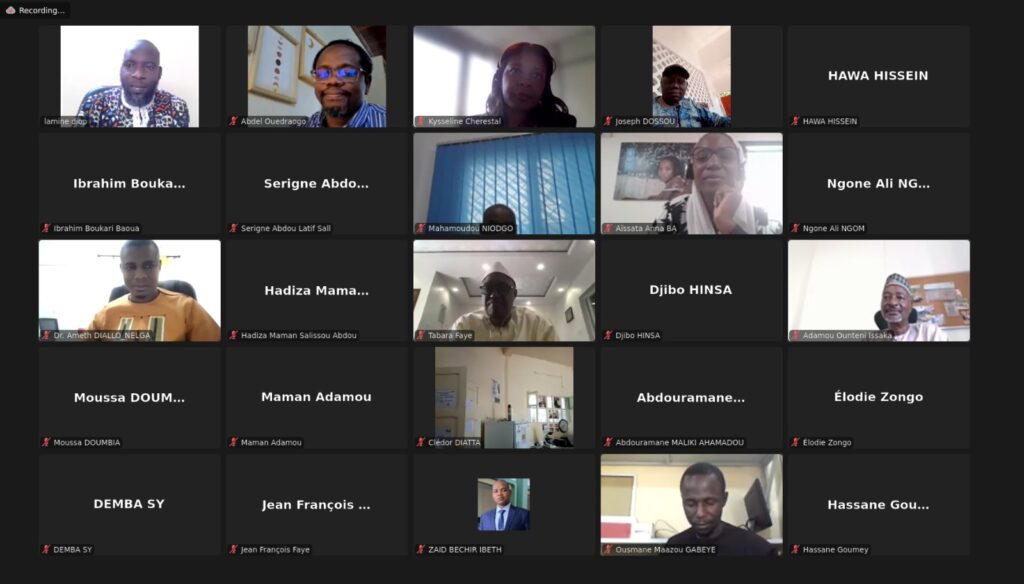
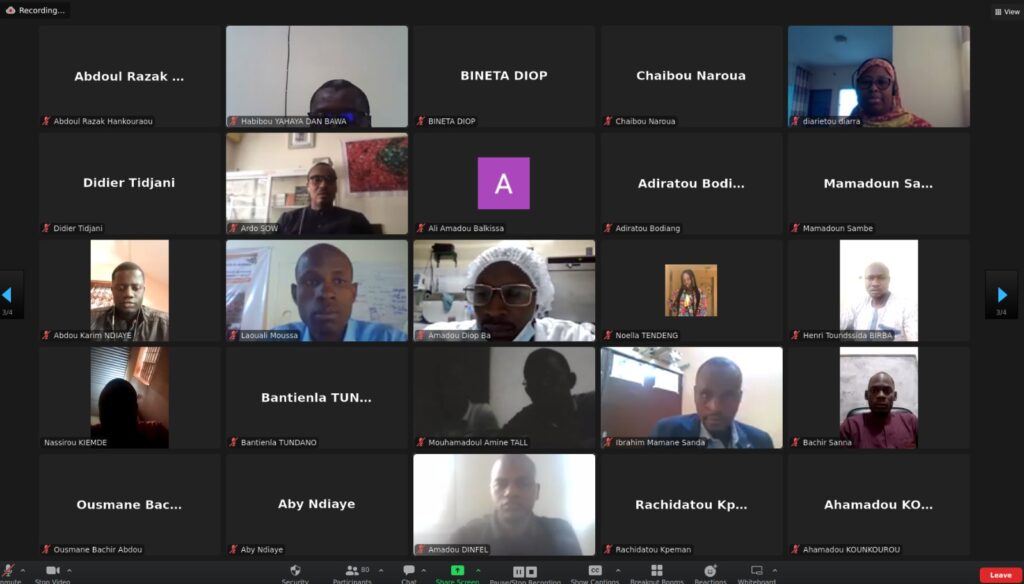
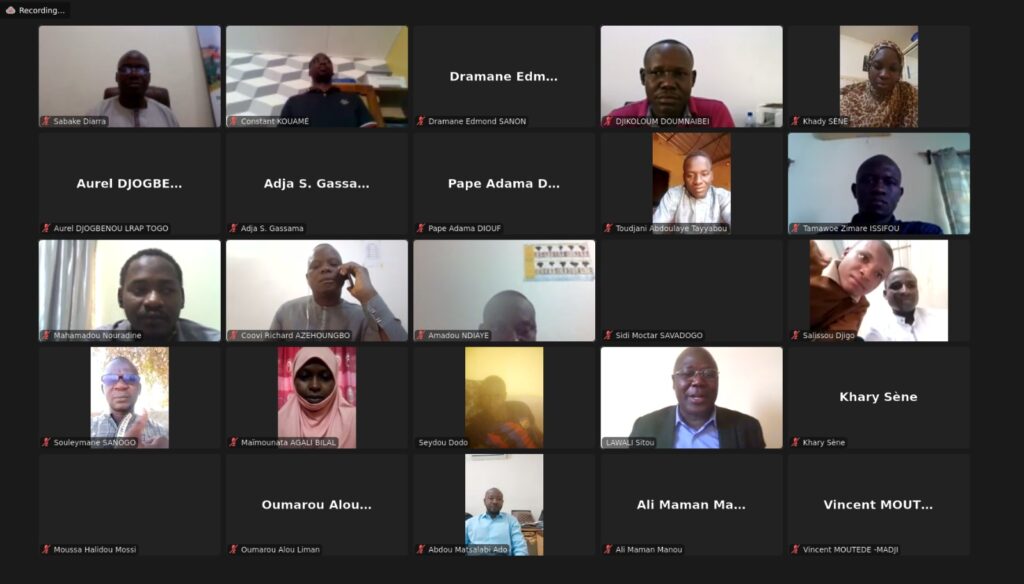
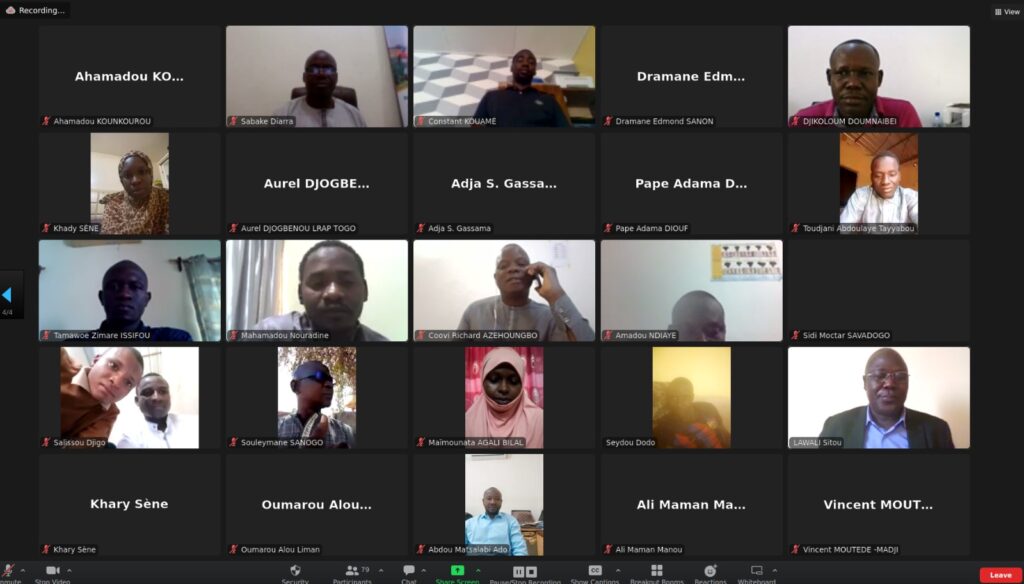
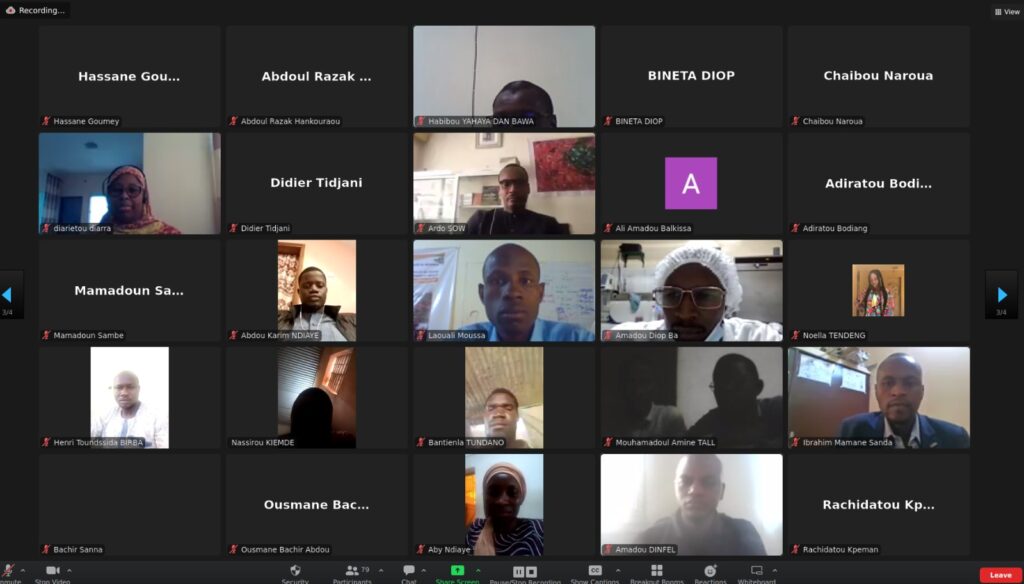
WEBINAR: Land governance in Sahelian countries: Current issues and challenges
CONTEXT AND JUSTIFICATION
The Sahel region is characterized by strong demographic growth. The population of the Sahel is expected to double by 2050, putting continued pressure on land resources. Added to this is desertification, which affects more than a third of the region's surface area, leading to a drastic reduction in the availability of productive land: 45% of land is affected by desertification and over 65% of productive land is degraded (FAO, 2021), making land management a crucial and complex issue. Climate change makes the situation even more complex, and poses a real challenge in terms of the availability and vulnerability of natural resources, particularly land. Furthermore, according to the UNDP (2019), the Sahel has experienced a series of droughts and food insecurity in recent years, which intensified land conflicts. The FAO has noted that many land problems arise due to weak governance, and efforts to resolve these problems depend on the quality of governance (FAO, 2012). However, this context is marked by several challenges and issues that underscore the importance of equitable and secure access to land for communities (FAO, 2017). Growing land issues have prompted several national land reforms and the adoption of the Voluntary Guidelines for Responsible Governance of Land Tenure in May 2012. It worth noting that land tenure reforms are underway in several Sahelian countries, aiming to improve land tenure security to promote sustainable natural resource management (CILSS, 2020). Additionally, it should be noted that several stakeholders, notably women, play a key role in land management, but are often not involved in decisions related to land ownership. The involvement of local communities, elected representatives and traditional chiefs is also crucial to guaranteeing productive land-related activities (Oxfam, 2021). Therefore, various challenges related to effective implementation of reforms arise, as highlighted by the World Bank (2018). To address these current challenges, solutions for land management in the Sahel need to be co-constructed by the various stakeholders involved. Collaboration among academics, governments, farmers; organizations, and communities is essential to ensure formal and sustainable land tenure security in the Sahel. It is against this backdrop that the “Réseau des Universités du Sahel pour la Résilience (REUNIR)” is organizing its second webinar on the theme of "Land tenure governance in Sahelian countries: current issues and challenges". The objective is to facilitate exchanges, share experiences, and capitalize on best practices in land tenure security.
WEBINAR OBJECTIVES
- Share knowledge on land management in the Sahel: Issues and Challenges;
- Share best practices in land management in Africa in a context of climate change;
- Formulate practical recommendations for improving land management in Sahelian countries.
PARTICIPANTS
L’événement verra la participation des professeurs et étudiants des universités du Sahel, des membres des institutions de recherches, des institutions gouvernementales, et des agences des Nations Unies.
L’événement verra la participation des professeurs et étudiants des universités du Sahel, des institutions de recherches, d’institutions gouvernementales, et des agences des Nations Unies.
Professeur Aboubacar TOGUYENI, Enseignant Chercheur à l’Université Nazi Boni du Burkina Faso, Secrétaire Exécutif de REUNIR présidera le webinaire
Professor Sitou LAWALI, Enseignant Chercheur à l’Université Dan Dicko Dankoulodo de Maradi au Niger et Spécialiste des questions foncières assurera la modération du webinaire avec pour panelistes : Dans sa note introductive, il présentera les attentes du Réseau pour ce webinaire ainsi que les grands axes autour desquels les échanges vont se focaliser notamment les enjeux et défis actuels, les modes de gouvernance ainsi que les rôles des divers acteurs.
La première communication sera celle de Dr Ameth DIALLO, représentant du Réseau d’Excellence sur la Gouvernance Foncière en Afrique de l’Ouest francophone (NELGA) abordera la problématique de la gouvernance foncière en Afrique de l’Ouest : enjeux et défis actuels. Il abordera également les rôles du Réseau NELGA dans l’atteinte des objectifs de l’Union Africaine (UA) en matière de sécurisation foncière rurale.
Ensuite suivra une communication de Dr Ibrahima KA, Chargé du Foncier Rural, Expert de l’observatoire régional du foncier rural en Afrique de l’Ouest (ORFAO) qui se veut un outil pour la gestion du foncier rural dans les Etats membres de l’Union Economique et Monétaire Ouest Africaine (UEMOA). Le communicateur échangera avec les participants sur le niveau de l’opérationnalisation de l’observatoire en matière de partage d’informations relatives à l’adoption et la mise en œuvre des politiques foncières rurales dans les pays membres, les dynamiques et les mutations foncières en cours, ainsi que les expériences réussies de sécurisation foncière.
La troisième communication sera assurée par Madame Kysseline CHERESTAL, Représente de la FAO, qui nous parlera des Directives volontaires pour une Gouvernance responsable des régimes fonciers applicables aux terres, aux pêches et aux forêts dans le contexte de la sécurité alimentaire nationale. Ces Directives visent à améliorer la gouvernance foncière des terres, des pêches et des forêts, au profit de tous, en accordant une attention particulière aux populations vulnérables et marginalisées. Elles visent également à améliorer la gouvernance foncière en fournissant des indications et des informations sur les pratiques acceptées au niveau international.
La quatrième communication est celle de Mr Amadou KANOUTE, Représentant de la société civile ouest africaine. Cette communication abordera la perception des enjeux et défis fonciers actuels des communautés et des utilisateurs des ressources mais également de leurs appréciations des approches et moyens de sécurisation des terres de plus en plus convoitées à travers des transactions monétarisées et parfois conflictuelles.
Après ces quatre importantes communications, les participants échangeront avec les communicateurs à
travers des questions réponses ou des contributions sur des cas spécifiques de leurs pays.
Enfin le Modérateur tira la synthèse des différentes interventions ainsi que les leçons apprises avant de tirer des conclusions de la rencontre.
Dr (MC) Sabaké T. DIARRA and Dr (MC) Lamine DIOP, membres du bureau de REUNIR assureront le rapportage du Webinaire.
METHODOLOGY
The webinar will be held on January 16, 2024, from 10 am to 1 pm GMT on the Zoom platform. Each speaker will give a plenary presentation of no more than 15 mm. The presentations will be followed by a series of questions and answers as well as discussions. The moderator will facilitate the exchanges, considering the timing of each intervention. The link will be sent one week before the webinar, with reminders every two days.
Inscription Link : https://bit.ly/reunir-webinary
Once you have registered, you will receive a confirmation e-mail with instructions on how to join the meeting.
EXPECTED RESULTS
- Current issues and challenges in land governance are discussed;
- Land management methods in Sahelian countries are shared;
- Best practices in land management in Africa in a context of climate change are shared;
- Practical recommendations for improving land management in the Sahel.
AGENDA
| TIME | TIME (in minutes) | SESSION | OBJECTIVES | PRESENTERS |
| OPENING SESSION : Moderator: Professor Sitou LAWALI | ||||
| 3 | Introduction | Welcome and presentation of the REUNIR network | Prof. Aboubacar TOGUYENI Executive Secretary of REUNIR | |
| 3 | Importance of the theme, overview of the Sahelian context | Dr Sabaké T. DIARRA, Research Manager - REUNIR | ||
| 3 | Course of the webinar | Introduction of participants and Webinar objectives and expectations | Moderator : Professor Sitou LAWALI | |
| 15 | Communication 1 | Land management: regulatory, legal and institutional framework in the Sahel - Issues and challenges for sustainable agricultural production in the Sahel ? | Dr Ameth DIALLO Network of land tenure academics (NELGA) at Gaston Berger University in Senegal | |
| 15 | Communication 2 | What are the best land management practices in the Sahel? The role of the Observatoire régional du foncier rural en Afrique de l'Ouest (ORFAO) A What results have these good practices achieved? | Dr. Ibrahima KA In charge of rural land tenure and ORFAO operationalization | |
| Communication 3 | Voluntary Guidelines for Responsible Governance of Tenure of Land, Fisheries and Forests in the Context of National Food Security. What prospects for securing land for vulnerable and marginalized populations? | Mrs. Kysseline CHERESTAL Expert in sustainable natural resource management, FAO | ||
| 15 | Communication 4 | What are the recommendations for better land management in Africa? What strategies involving academics, the state, civil society and organizations are needed for sustainable land management? | Mr Amadou KANOUTE Représentant de la Société civile Africaine | |
| 20 | Q&A/Open floor | Questions and comments from the audience | Attendees | |
| 5 | Conclusion and summary of the session | Summary of key points, action points and next steps | Prof. Sitou LAWALI REUNIR's external relations and communications manager to be identified | |
| 5 | Conclusion | Thanks to all speakers and participants | Prof. Aboubacar TOGUYENI, Executive Secretary - REUNIR | |
| FIN | ||||
